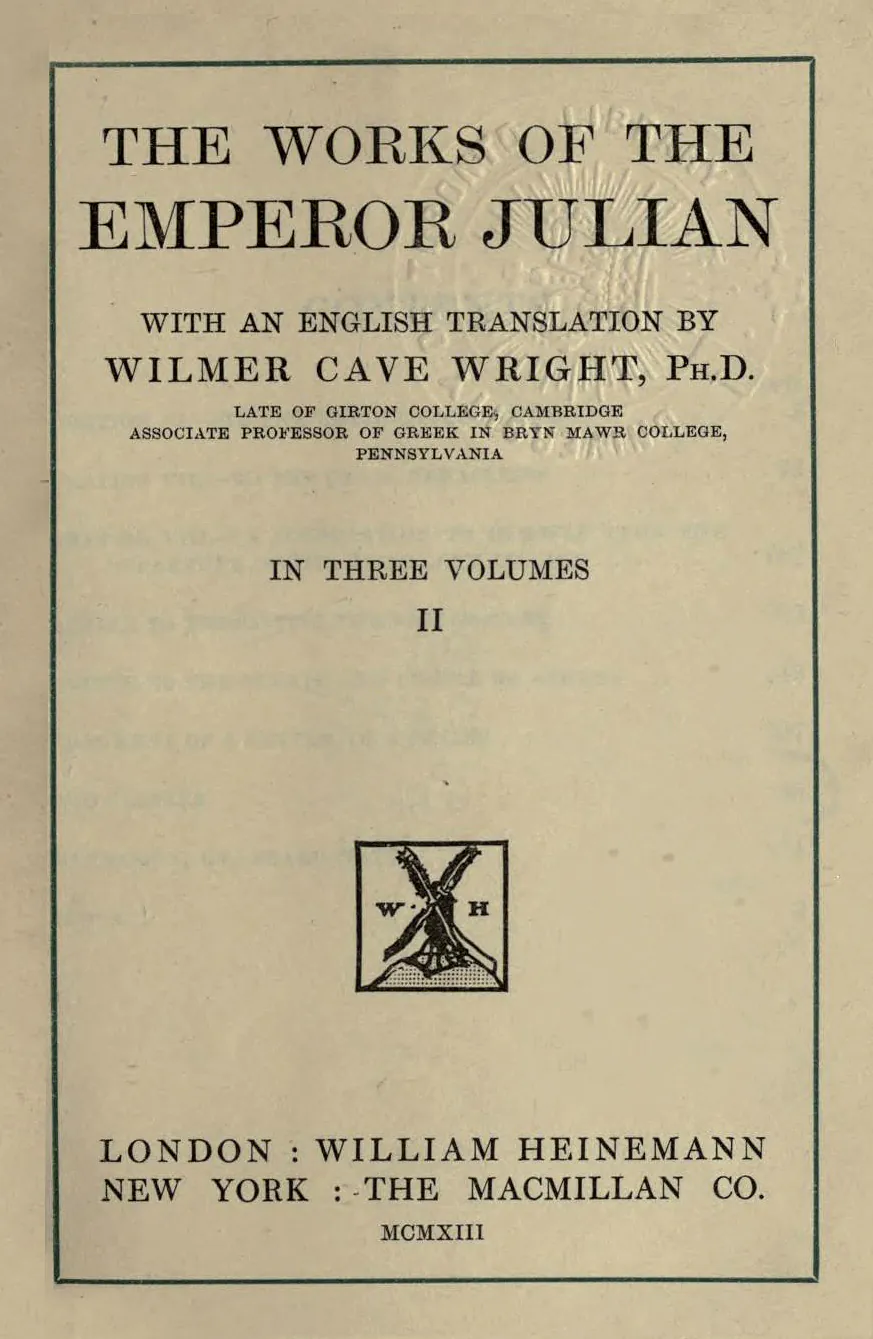[A]
καὶ τοῦτο ποιῶν ὀρθῶς οἴει ποιεῖν καὶ φρονεῖν ὑπὲρ τῶν σεαυτοῦ. λογίσασθαι ἐχρῆν, ὅτι τῶν μὲν ἀδικουμένων οὐδεὶς αἰτιᾶται τοὺς ἄρχοντας, ἀλλὰ τὸν ἀδικήσαντα, ὁ δ ̓ ἀδικῶν εἶτα εἰργόμενος, ἀφεὶς μέμφεσθαι τὸν ἀδικούμενον, εἰς τοὺς ἄρχοντας τρέπει τὸ ἄχθος.
Ἐξὸν οὖν ὑπὸ τῆς εὐλογιστίας ταύτης ἀπέχεσθαι μὲν τοῦ τὰ δίκαια ποιεῖν ἀναγκάζειν, ἐπιτρέψαι δ ̓ ἑκάστῳ πράττειν ὅ, τι
[B]
ἂν ἐθέλῃ καὶ δυνατὸς ᾖ· τὸ γὰρ τῆς πόλεως ἦθος οἶμαι τοιοῦτόν ἐστιν, ἐλεύθερον λίαν· σὺ δὲ οὐ ξυνεὶς ἄρχεσθαι αὐτοὺς μετὰ φρονήσεως ἀξιοῖς; οὐδ ̓ ἀπέβλεψας ὅση καὶ μέχρι τῶν ὄνων ἐστὶν ἐλευθερία παρ ̓ αὐτοῖς καὶ τῶν καμήλων; ἄγουσί τοι καὶ ταύτας οἱ μισθωτοὶ διὰ τῶν στοῶν ὥσπερ τὰς νύμφας· οἱ γὰρ ὑπαίθριοι στενωποὶ καὶ αἱ πλατεῖαι τῶν ὁδῶν οὐκ ἐπὶ τούτῳ δήπου πεποίηνται, τῷ χρῆσθαι αὐταῖς τοὺς κανθηλίους, ἀλλ ̓ ἐκεῖναι μὲν αὐτὸ δὴ τοῦτο κόσμου τινὸς ἕνεκα πρόκεινται καὶ πολυτελείας,
[C]
χρῆσθαι δὲ ὑπ ̓ ἐλευθερίας οἱ ὄνοι βούλονται ταῖς στοαῖς, εἴργει δ ̓ αὐτοὺς οὐδεὶς οὐδενός, ἵνα μὴ τὴν ἐλευθερίαν ἀφέληται· οὕτως ἡ πόλις ἐστὶν ἐλευθέρα. σὺ δὲ ἀξιοῖς τοὺς ἐν αὐτῇ νεανίσκους ἄγειν ἡσυχίαν καὶ μάλιστα μὲν φρονεῖν ὅ, τι σοι φίλον, εἰ δὲ μή, φθέγγεσθαι ὅσων ἂν ἡδέως ἀκούσῃς.1ἀκούσῃς Hertlein suggests, ἀκούσαις MSS.οἱ δὲ ὑπ ̓ ἐλευθερίας εἰώθασι κωμάζειν, ἀεὶ μὲν ἐπιεικῶς αὐτὸ ποιοῦντες, ἐν δὲ ταῖς ἑορταῖς πλέον.
Ἔδωκάν ποτε τῶν τοιούτων σκωμμάτων Ῥωμαίοις Ταραντῖνοι δίκας,
[D]
ὅτι μεθύοντες ἐν τοῖς Διονυσίοις ὕβρισαν αὐτῶν τὴν πρεσβείαν. ὑμεῖς δέ ἐστε τῶν Ταραντίνων τὰ πάντα εὐδαιμονέστεροι, ἀντὶ μὲν ὀλίγων ἡμερῶν ὅλον εὐπαθοῦντες ἐνιαυτόν, ἀντὶ δὲ τῶν ξένων πρέσβεων εἰς αὐτοὺς ἐξυβρίζοντες τοὺς ἄρχοντας καὶ τούτων εἰς τὰς ἐπὶ τοῦ γενείου τρίχας καὶ τὰ ἐν τοῖς νομίσμασι χαράγματα.
[A]
and when you do this you think that you are doing right and are wise about your own affairs. You ought to have taken into account that, when men are wronged, not one of them ever blames the magistrates but only the man who has wronged him; but the man who seeks to do wrong and is prevented from it, far from blaming his proposed victim, turns his grievance against the magistrates.
“Then when it was in your power by the aid of this careful reasoning to refrain from compelling us to do what is just;
[B]
when you might have allowed every man to do whatever he pleases and has the power to do, – for the temper of the city is surely like that, excessively independent – do you then, I say, fail to understand this and assert that the citizens ought to be wisely governed? Have you not even observed what great independence exists among the citizens, even down to the very asses and camels? The men who hire them out lead even these animals through the porticoes as though they were brides. For the unroofed alleys and the broad highways were certainly not made for the use of pack-asses, but they are provided merely for show and as an extravagance;
[C]
but in their independence the asses prefer to use the porticoes, and no one keeps them out of any one of these, for fear he should be robbing them of their independence; so independent is our city! And yet you think that even the charming youths in the city ought to keep quiet and, if possible, think whatever you like, but at any rate utter only what is agreeable for you to hear! But it is their independence that makes them hold revels; and this they always do handsomely, but during the festivals they revel more than usual.”
Once upon a time the citizens of Tarentum paid to the Romans the penalty for this sort of jesting,
[D]
seeing that, when drunk at the festival of Dionysus, they insulted the Roman ambassadors. But you are in all respects more fortunate than the citizens of Tarentum, for you give yourselves up to pleasure throughout the whole year, instead of for a few days; and instead of foreign ambassadors2In 272 B.C. the Romans took Tarentum. you insult your own Sovereign, yes even the very hairs on his chin and the devices engraved on his coins.3The people of Antioch ridiculed the Pagan symbols, such as the figures of Helios, the sun-god, which Julian had engraved on his coinage.
EN translation: Wilmer Cave Wright, 1913
LEARN MORE
Place your mouse over a term to see corresponding popup from Wikipedia.
ALL PAGES

| Title | London: The Works of the Emperor Julian, Volume II/III |
| Publisher | London: William Heinemann |
| Year | 1913-23 |
| Pages | 416-511 pp. [vol. II: 538 pp.] |
| Translation | Wilmer Cave Wright. PhD |
| Editors | T.E. Page and W.H.D. Rouse |


